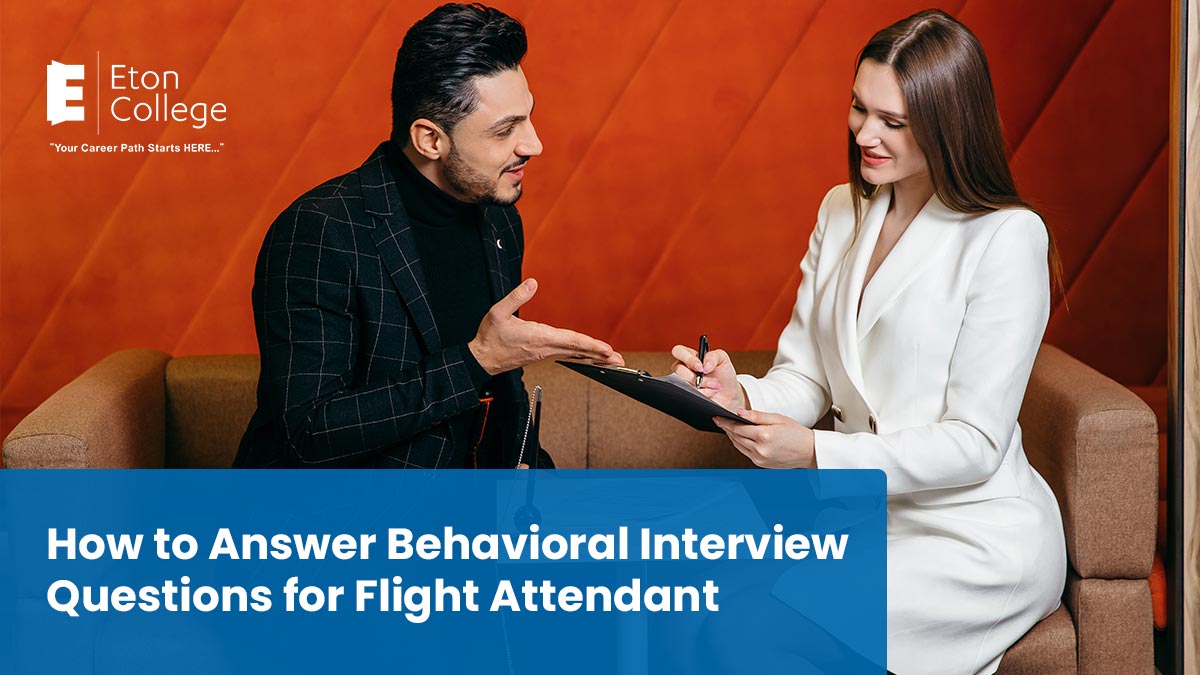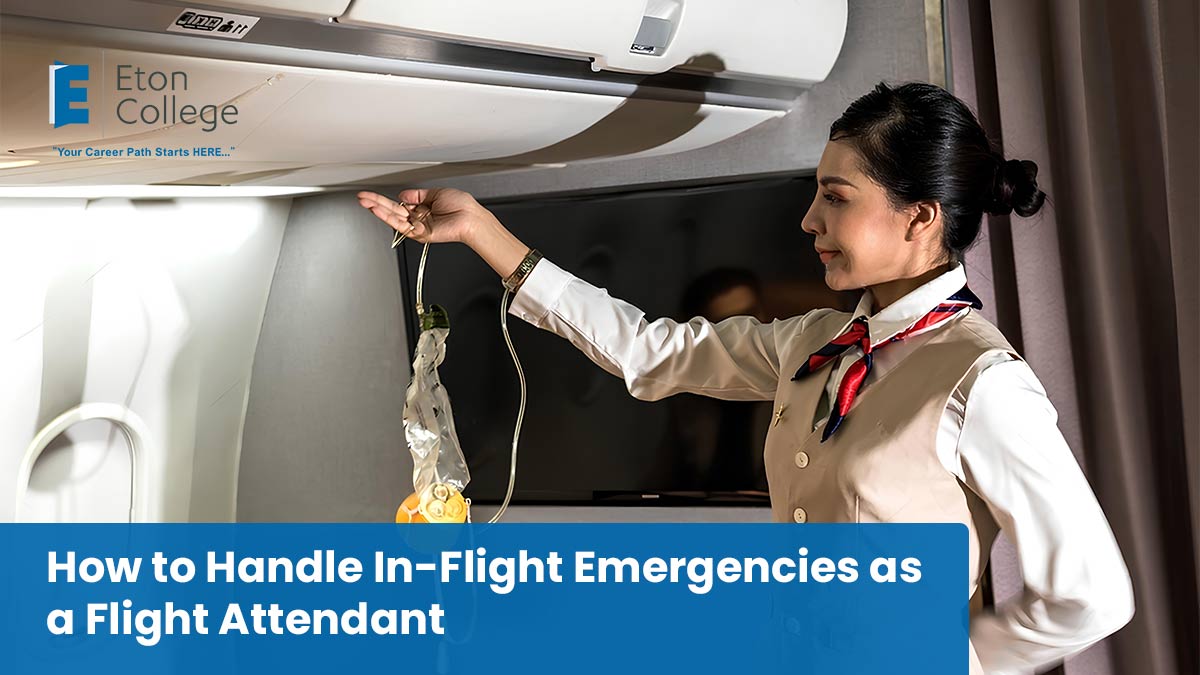- Use the STAR technique (Situation, Task, Action, Result) to structure clear and concise answers during the flight attendant interview.
- Demonstrating calmness and authority in handling disputes between passengers is essential for maintaining order in-flight.
- Showing your ability to assess medical emergencies and make quick decisions reflects your readiness for critical flight attendant duties.
- Flexibility and willingness to support your team, even when facing personal challenges, are key qualities sought in a flight attendant interview.
- Highlight your experience handling difficult customers by showing empathy, professionalism, and resolution skills.
A flight attendant interview often includes behavioral questions, which are designed to assess how you handle various situations. These questions help recruiters evaluate your problem-solving skills, your ability to work under pressure, and your approach to customer service.
Related:Mock Flight Attendant Interviews: How to Practice for Success
Mastering how to answer these questions effectively is crucial to making a strong impression during the flight attendant interview. A popular method for structuring your answers is the STAR technique, which stands for Situation, Task, Action, and Result.
In this blog, we will explore common behavioral questions you may encounter in a flight attendant interview, provide sample answers using the STAR framework, and offer tips for delivering confident and thoughtful responses.
1. Handling Conflicts Between Passengers
Question: How would you handle a situation where two passengers were arguing and disturbing the rest of the travelers?
Explanation: This behavioral question is designed to estimate how you handle conflicts and maintain order in the cabin. The interviewer wants to know that you can manage difficult situations calmly and professionally, ensuring the safety and comfort of all passengers. Use the STAR system to easily outline how you would approach the situation.
Example:
Situation: “If I were presented with a circumstance in which two passengers were bickering and disrupting the other passengers…”
Task: “…my main responsibility would be to de-escalate the situation and restore peace.”Action: “I would approach them with a calm but assertive tone and request that they talk to me individually. I would listen carefully to each passenger, understanding the root of the problem before proposing a solution.”
Result: “Once both passengers felt heard, I’d suggest a solution that would satisfy both of them while also providing comfort for the other passengers. However, I would involve another crew member or the cabin administration or supervisor to ensure the situation was resolved professionally, if the issue persisted.
This kind of response shows that you can keep a cool head under pressure, prioritize the well-being of passengers, and work collaboratively to find solutions during your flight attendant interview.
Related:20 Common Flight Attendant Interview Questions
2. Addressing a Passenger’s Medical Emergency
Question: What would you do if a passenger on the airplane claimed to be terribly unwell and demanded an emergency landing?
Explanation: Flight attendants must balance the needs of an individual passenger with the safety and schedule of the entire flight. This question tests your capability to assess a medical situation quickly and communicate effectively with the rest of the crew. Again, utilize the STAR approach to arrange your response.
Example:
Situation: “If a passenger reports a medical emergency…”
Task: “…my priority would be to assess their condition and determine the severity of the situation.”
Action: “I would stay calm and apply my training in first aid to evaluate the passenger’s condition. I’d reassure them while alerting the flight deck to the issue. If the condition seemed manageable, I’d suggest continuing the flight while offering comfort. If the situation warranted it, I would request the flight to be diverted to the nearest airport.”
Result: “By following established protocols and remaining calm, I would ensure the safety of the passenger without causing unnecessary alarm or disruption to the rest of the flight.”
Your ability to remain composed and follow proper procedures during a medical emergency is a key quality interviewers seek in a flight attendant interview.
Related:Post-Interview Etiquette for Flight Attendant Candidates
3. Working Under Pressure
Question: How would you respond if you were asked to fill in for another attendant who had become ill after a busy week, but you were looking forward to some time off?
Explanation: This question tests your flexibility and commitment to the role of a flight attendant. The interviewer wants to see how you balance personal needs with the demands of the job, and how willing you are to go above and beyond when needed.
Example:
Situation: “If I had a busy week and was looking forward to some time off, but was asked to fill in for an ill colleague…”
Task: “…Before making a choice, I’d need to assess my own physical and mental well-being.”
Action: “If I thought I was up to the challenge, I would accept the extra shift and do my best. However, if I wasn’t feeling 100%, I would explain to the scheduler why it might not be in the airline’s best interest for me to take on the additional shift.”
Result: “By considering both my well-being and the airline’s needs, I would make a balanced decision that ensures passenger safety and service quality.”
This answer shows that you understand the importance of self-care while remaining dedicated to fulfilling your responsibilities. Interviewers appreciate honesty and a thoughtful approach during the flight attendant interview.
Related:Pack for Success: Key Essentials for Your Flight Attendant Interview
4. Handling Difficult Passengers
Question: Can you give an example of a time when you had to deal with a particularly difficult customer?
Explanation: Flight attendants are on the frontlines of customer service and often deal with passengers who may be frustrated, anxious, or upset. This question allows the interviewer to assess how you handle challenging interactions while maintaining professionalism.
Example:
Situation: “In my prior employment, I encountered a customer who was dissatisfied with a service issue…”
Task: “…my goal was to de-escalate the situation and find a resolution that satisfied the customer.”
Action: “I carefully listened to the customer’s complaints, apologized for the inconvenience, and proposed a solution that was within the confines of company policies. I made sure to check back with the customer later to ensure they were satisfied with the resolution.”
Result: “The client left feeling heard and appreciated, and I was able to turn a negative situation into a positive one.”
This answer demonstrates that you possess the strong customer service skills necessary to succeed in a flight attendant interview and build a successful career in aviation.
5. Managing Time and Responsibilities
Question: How do you manage your time and tasks when you have multiple duties to perform simultaneously?
Explanation: As a flight attendant, you are often required to juggle several responsibilities at once, from assisting passengers to coordinating with crew members. This question helps interviewers determine if you can prioritize effectively under pressure.
Example:
Situation: “In my previous roles, I often had to manage multiple tasks under tight deadlines…”
Task: “…my primary objective was always to ensure that I completed each task efficiently without compromising quality.”
Action: “I used time management techniques like prioritizing urgent tasks and delegating when necessary to ensure all duties were completed.”
Result: “By staying organized and focused, I was able to meet deadlines while maintaining high standards of performance.”
This demonstrates your ability to multitask and prioritize, a vital skill to showcase during a flight attendant interview.
Related:Dress Code and Appearance Tips for a Flight Attendant Interview
Preparing for Your Flight Attendant Interview
Answering behavioral questions effectively during a flight attendant interview requires confidence, preparation, and understanding of the role. For aspiring flight attendants, Eton College offers a comprehensive Flight Attendant Preparation Program designed to provide the necessary skills and knowledge to excel in interviews and in the aviation industry. The right preparation can set you up for success, ensuring you’re ready for any challenge that comes your way during the flight attendant interview process.




